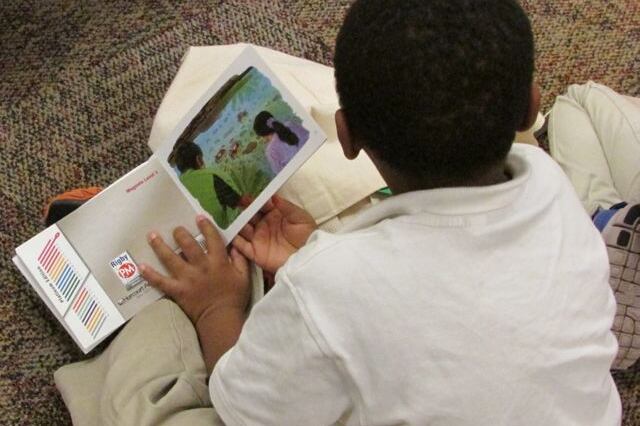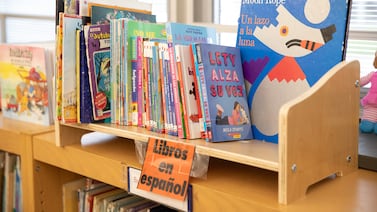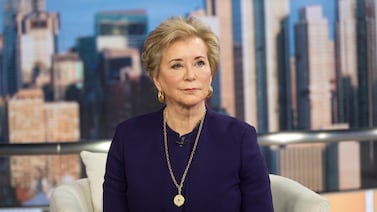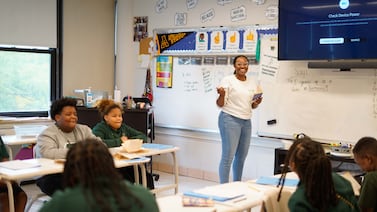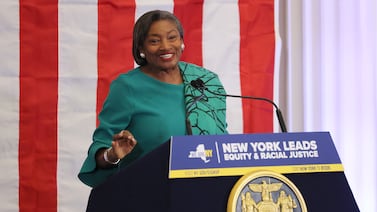Left alone on a bus somewhere on Chicago’s South Side last January, a 4 year old contracted frostbite on a foot. The weather was “very cold,” a report would later read, and the child was “unattended on the bus for an undetermined period of time.”
At a different child care center on the West Side, a master teacher slapped a child, leaving a red mark. Elsewhere in the city, a preschool teacher hit a toddler and pulled the child’s hair.
The federal government says Chicago has not done enough to correct health and safety problems in the child care programs it oversees for some 11,000 children. That has sparked a chain of events that could curtail Chicago’s early learning powers and threaten its universal prekindergarten expansion, Chalkbeat has learned.
After parents and teachers reported seven serious incidents across the past 16 months in Chicago’s child care facilities, the U.S. Department of Health and Human Services notified the city that it will rebid $176 million in grants that previously went straight to City Hall. The grant posting says the government will open up competition in September.
At stake is the city’s largest chunk of early childhood dollars — money that currently funds programs for low-income children, mostly on the South and West sides. The amount could end up getting divided among up to 29 grantees, the agency says.
“These are pretty serious issues,” said Lauri Morrison-Frichtl, the executive director of the Illinois Head Start Association, a membership organization of providers statewide. “The city based its new structure on Head Start funding and now they are going to lose some of those dollars and some of those children. It now throws a wrench in their planning.”
The federal government’s move could potentially carve up Chicago’s largest early education funding source. If that happens, it would be just the latest disruption to the city’s early childhood system, which has been poised for broad expansion under an ambitious universal prekindergarten plan. Under the original plan, developed by former Mayor Rahm Emanuel’s administration, the city intended to create a program that would provide every 4-year-old in the city a free, full-day spot in a prekindergarten classroom by 2021.
Community providers were a core part of the strategy. Predicting many would lose 4-year-olds to schools, the city said it would help fund more seats in community day cares for children 3 and under, effectively creating a high-quality education pipeline for thousands more families.

That didn’t exactly happen. The architects of the original plan departed City Hall after Mayor Lori Lightfoot took office, a funding shake up sowed distrust between providers and the new administration, schools and community providers did not coalesce around a single path forward, and now two lawsuits take aim at how the city decided whom to fund and for how much.
A spokeswoman for the city Department of Family and Support Services, which oversees community-based early programs, said that Chicago “takes very seriously its role in supporting community-based organizations to provide high-quality services and care.”
It is primed to respond and implement corrective action, if needed, she said.
“Upon learning of any infractions, (the agency) immediately responds and partners with (the federal Head Start administration) to implement the best possible corrective action,” she wrote, adding that Chicago provides supplemental training and technical assistance for the organization when incidents occur.
Chicago says it will rebid for the grant. It’s possible it could edge out potential competitors and receive the full amount.
The power flickers
Cities like New York and Los Angeles used to have more control over early learning, but in recent years, the federal government similarly carved up Head Start funds, spreading the grants among multiple agencies.
Head Start programs are among the most respected in the child care world. They are regularly monitored for quality, require teachers to have certain classroom credentials, and must involve parents in the program.
By cutting out cities as the sole middlemen, some argued, more dollars went directly to agencies that operate programs for children and families, instead of bureaucracies. But there were downsides: By losing a monopoly over early learning money, cities also lost valuable leverage that they used to set high-quality benchmarks and to steer ambitious initiatives such as universal pre-kindergarten, which can require buy-in from both community providers and school districts.
In New York, the carve-up affected “what level of planning the city can do,” said Gregory Brender, the director of children and youth services at United Neighborhood Houses in New York City. “Because there’s no guarantee that any neighborhood that has high need has a high quality provider. There are organizations that have developed excellent programs but there’s not a system behind it that ensures that every low income neighborhood would have it.”
While each city is still responsible for the care of thousands of children, more agencies now share that role, which means they can determine how many seats they offer — and where — by deciding which centers receive funding and how much.
The impact of the grant shakeup on Chicago’s universal pre-kindergarten rollout remains to be seen. If agencies are able to contract directly with the federal government to provide services, they may have less incentive to serve younger children, as the plan originally intended, and continue to compete with schools.
Last school year, Chicago had about 1,800 preschool openings in school-based programs but more than 6,000 children on waitlists, a mismatch that can partly be explained by geographic demand in some neighborhoods exceeding that of others and by a high demand for seats for 3-year-olds who technically only qualify for limited seats.
In all, about 23,000 children were enrolled in programs across community centers and school prekindergarten classrooms — but experts have said that’s only a fraction of those who qualify. And if the system faced challenges before the pandemic, coronavirus has made it doubly hard by threatening the livelihoods of child care centers and school district budgets. The CEOs of 14 Chicago child care organization recently wrote a letter to the mayor asking for a financial injection as they battled rising costs and declining enrollment.
The school district, meanwhile, is moving ahead with a scaled-back preschool expansion. Chicago’s $8.4 billion school budget proposal, which will go before the Board of Education for a vote Aug. 26, says the district will invest $100 million in opening new classrooms and that 43 additional rooms are on the docket for the coming year.
Lightfoot has so far said she’s still moving ahead with universal pre-kindergarten. As for concerns that the city’s reshuffling of early money has been characterized by delays, technical glitches, poor communication, and a lack of transparency, City Hall earlier this summer released the results of an audit by a prominent law firm that concluded the city’s last funding process was “appropriate, fair, and unbiased.”
Parents at some centers that lost money in the shake-up, meanwhile, have had to face classroom closures and educator layoffs. In June, a few hundred parents gathered at City Hall to protest the city’s decision making.
Asucena Gaona marched with her three children, ages 10, 3, and 1, and said she was worried about finding an alternative day care center as hers faced closure. “Without them, how do I find education for my kids?”
Fallout from ‘deficiencies’
The federal government, however, appears to be using a different lens to re-evaluate Chicago’s ability to steer early childhood funding. The question, simply, is whether Chicago can sufficiently oversee a program that spans many sites and thousands of children.
“The City of Chicago is currently forecasted to need to compete for continued funding, because of the deficiencies identified,” according to a federal administration spokesman.
According to federal Head Start records, the program flagged at least 7 major infractions at city-funded agencies dating back to January 2019. The most egregious — accounting for 5 of the cases — were leveled at an All About Kids center in Chicago’s Greater Grand Crossing neighborhood on the city’s South Side. A child there was left on a bus “in very cold weather” in January 2019, according to reports, and a pediatrician subsequently diagnosed frostbite.
A few months later, the same child was injured in a bus accident, and center staff did not immediately administer medical treatment or notify the mother.
The reports say no one followed proper protocols for reporting the incidents to the authorities — not the center, nor a delegate organization overseeing the center, nor the city itself, which was supposed to alert the federal Head Start agency.
“The grantee did not report, as appropriate, to the responsible Health and Human Services official immediately or as soon as practicable, any significant incidents affecting the health and safety of program participants,” the report reads. “Therefore, it was not in compliance with the regulation.”
If Chicago loses any part of its federal grant, it would change the landscape of early learning in the city, said Morrison-Frichtl, of the Illinois Head Start Association.
“Things have been turned upside down,” she said.
What happens next remains to be seen. Dana Garner, a Chicago child care advocate, said that whatever happens next, children need to be at the center of the conversation.
“At this moment, our children deserve everything we can give,” said Garner. “These children have been traumatized enough in the City of Chicago. We need a stable early childhood system that our families can trust and where our children can grow.”
This story was published as part of a collaboration of seven Chicago newsrooms examining Mayor Lori Lightfoot’s administration. Partners are the BGA, Block Club Chicago, Chalkbeat Chicago, The Chicago Reporter, The Daily Line, La Raza and The TRiiBE.

